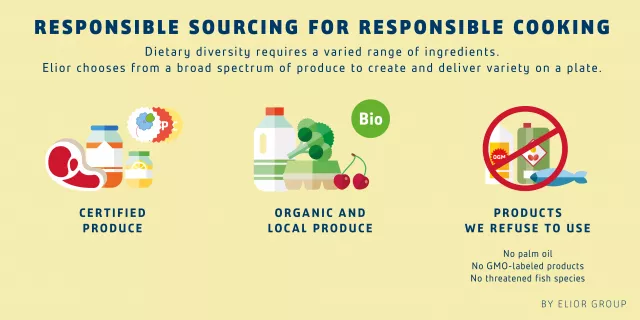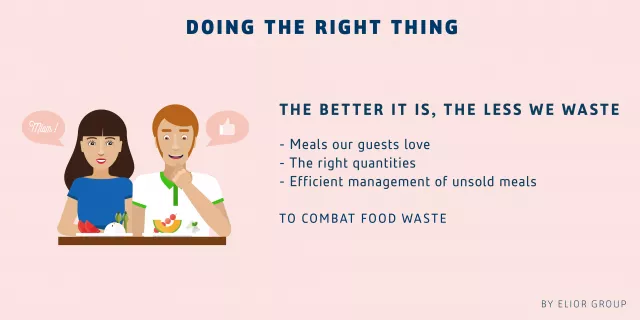As a responsible caterer and member of the United Nations Global Compact since 2004, Elior Group is committed to the protection of biodiversity. At every stage of the value chain, the Group offers responsible catering services which respect the diversity of all living organisms. Between May 30th and June 5th, Elior Group and Elior France will be participating in the European Sustainable Development Week to raise the awareness of their 4 million customers to the challenges of biodiversity.
Press Release
PDF - 142.33 KB
Understanding biodiversity (Infographic)
PDF - 104.2 KB
Elior France commitment (Infographic)
PDF - 100.31 KB
Understanding and respecting biodiversity requires adopting a healthy, balanced diet and having access to a wide range of products.
1. Choosing the right ingredients to cook sustainable meals
- Local, short supply chains: Elior France works with regional producers to develop local networks of sustainable food suppliers giving access to seasonal produce. In France, the Group has developed an exclusive tool for its purchasing departments that provides all of the local food producers by region (within 200 km from any given restaurant). The Group currently has a network of 11,000 geolocalized producers. Via the « Elior product selection », Elior France promotes local produce grown under conditions that respect the land and the environment in all of its restaurants. In this way, local produce is regularly featured on the menus: melons from the South-west of France, Corsica-grown clementines, kiwis from the Adour, etc.
- Certified and exclusive products: within the context of its responsible purchasing policy, Elior Group is committed to preserving fish populations by refusing to source protected deep-sea species, such as grenadier and emperor fish, as well as the most endangered members of the shark family and red tuna. Concerning meat supplies, since 2005, the Group has been a partner of the Bleu-Blanc-Cœur association which promotes the well-being of animals and sustainable agriculture. Elior France currently has 80 Bleu-Blanc-Cœur meat-product references. In addition, the Group does not use palm oil or any GMO-labeled products.
- Organic food products: Elior Group has been using organic food products for nearly 15 years and currently has 2,600 bio-product references. Organic products account for an estimated 5% of total purchases in France, and 7% in schools. As a pioneer in organic school catering, the Group’s bio-food purchases account for up to 40% of total purchases in some cities (Auxerre, Issy-les-Moulineaux). In addition, Elior Group is contributing toward the development of an organic-food network by assisting producers to adopt organic cultivation practices and associations and institutions to structure these organic-food networks. In 2015, Elior Group signed a charter with FNAB (French Organic Farming Federation) and the MBIM (Eat Organic Here and Now) network. Within the context of this partnership, the Group’s MBIM-sourced purchases have increased by 8% in a year.

2. Initiate good practices on a daily basis
- Better human-resources management for more energy-efficient catering services: Elior Group employees are trained in responsible practices and eco-gestures designed to raise awareness to reducing water consumption levels for example. Energy audits are carried out in central kitchens to identify posts that generate the highest levels of CO² and the potential areas for reducing energy consumption. The installation of eco-designed ovens has cut energy consumption by 20-40 %.
- Preparation of popular, tasty dishes: eat better; waste less. Elior Group has developed a savory catering offer adapted to all tastes. At the new culinary workshop in Ternay (in the Auvergne- Rhône-Alpes region), correct-temperature cooking appliances designed to conserve all of the gustative properties of meals prepared have been installed. Elior chefs test all of their recipes on children in school canteens, and any meal with a satisfaction rate of less than 70% is discarded.
- Collective fight against food waste: all of the Group’s restaurants ensure that the food portions served are reasonable and encourage consumers to adopt sustainable eating habits. Educational food-waste games are also organized in school canteens to raise the awareness of children to the quantities of bread and water wasted every day. Within five years, this awareness campaign has touched 600,000 children and reduced food waste by 20-30%. To encourage Parisians to adopt new anti-waste habits, Elior Group, together with the Paris City Hall and Synhorcat, launched the first Parisian doggy bag in 2015. The Group is hoping to encourage caterers to adopt new habits and allow consumers to take their left-overs home.

3. Waste management optimization at the end of the value chain
- Waste recycling: in line with its commitment to waste recycling, the Group promotes composting and anaerobic digestion to recycle biowaste. Used cooking oil is recycled as a form of renewable energy and table-clearing and waste-sorting facilities are installed in schools and companies to encourage diners to adopt proper recycling habits.
- Redistribution of unsold meals: the Group redistributes all unsold meals prepared for trade fairs and other such events to its charitable association partners.